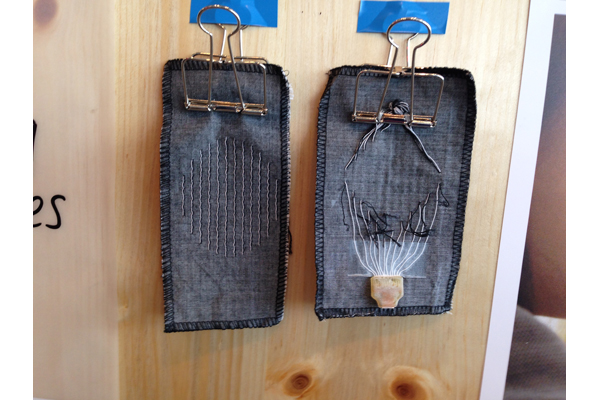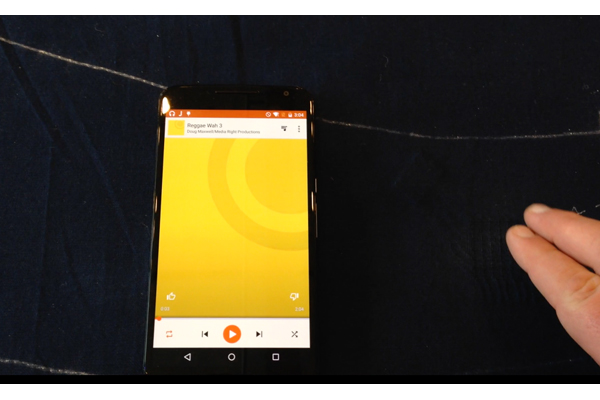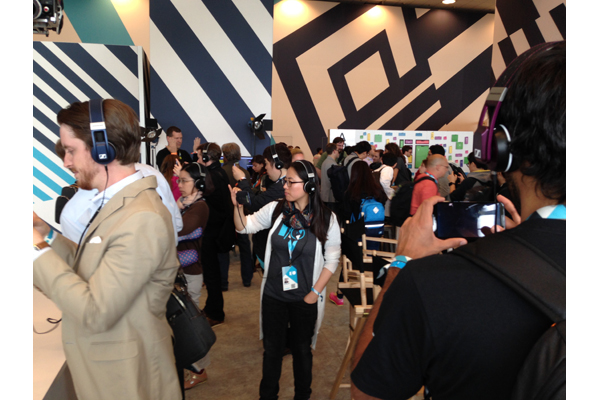Connected Pants? How Google Will Turn Clothes Into Controllers
A way to integrate electronic sensors with thread was among the many projects shown off by Google's experimental research team at the I/O developer conference.
Here at Tom’s Guide our expert editors are committed to bringing you the best news, reviews and guides to help you stay informed and ahead of the curve!
You are now subscribed
Your newsletter sign-up was successful
Want to add more newsletters?

Daily (Mon-Sun)
Tom's Guide Daily
Sign up to get the latest updates on all of your favorite content! From cutting-edge tech news and the hottest streaming buzz to unbeatable deals on the best products and in-depth reviews, we’ve got you covered.

Weekly on Thursday
Tom's AI Guide
Be AI savvy with your weekly newsletter summing up all the biggest AI news you need to know. Plus, analysis from our AI editor and tips on how to use the latest AI tools!

Weekly on Friday
Tom's iGuide
Unlock the vast world of Apple news straight to your inbox. With coverage on everything from exciting product launches to essential software updates, this is your go-to source for the latest updates on all the best Apple content.

Weekly on Monday
Tom's Streaming Guide
Our weekly newsletter is expertly crafted to immerse you in the world of streaming. Stay updated on the latest releases and our top recommendations across your favorite streaming platforms.
Join the club
Get full access to premium articles, exclusive features and a growing list of member rewards.

If Google's advanced research division has its way, the next time you see people swiping the arm of their jacket, they could just be trying to control a mobile device.
That's the thrust of Project Jacquard, one of the many experimental projects underway at Google's Advanced Technologies and Products, or ATAP, division. In front of a packed house, ATAP offered a 90-minute look at some of the things it's cooking up to kick off the second day of Google's I/O conference today (May 29), highlighted by Project Jacquard's very literal idea of wearable technology.
MORE: Best Smartwatches
Jacquard stems from a desire to more easily control wearable devices, especially with device screen sizes shrinking to the point where they become more difficult to operate. The people behind the Jacquard project hit on the idea of turning to textiles since, like multitouch screens, they're essentially made out of interlocking grids. Project Jacquard worked out a way to weave the sensors required to control a wearable device into a super-durable thread available in a multiple colors.
To prove the point, Ivan Poupyrev, a technical program lead at ATAP, wore a jacket on stage that a Savile Row tailor had sewn together with Project Jacquard's interactive fabric.
"You wouldn't call it a wearable," Poupyrev said. "You'd call it a jacket."

And it really does work. In a demo area at Google I/O, ATAP had set up a table with some of the Project Jacquard fabric. Tapping on the sensor woven into the material, I could make a nearby phone start playing a song. A sideways swipe let me skip to the next track while swiping up and down adjusted the volume. Maybe that seems like overkill for controlling something with a screen the size of a smartphone, but the people behind Project Jacquard have devices like smartwatches -- or even smaller -- in mind.
This isn't just a cool demo at a developer conference, either. ATAP used the presentation to announce a partnership with Levi's to develop clothing using the technology developed in Project Jacquard. There's no word on how soon you'll be able to unlock a smart device from your 501 blue jeans, but a Levi's executive promised apparel that's "emotional, aspirational and functional."
It says something about the number of innovations on display at today's ATAP event that Justin Lin, the auteur behind the Fast and the Furious film series, seemed almost relegated to second-billing. Lin shot a short movie for Google's Spotlight Stories, which feature 360-degree views and interactive stories. Lin's movie -- a short about a monster wreaking havoc on a city -- is the first live-action Google Spotlight Story, requiring a specially-built four-camera rig as well as monitors providing on-set live stitching and real-time feedback so that the director could monitor what he was filming.

Google Spotlight Stories is currently available as an Android app, with an iOS version coming soon. You'll also be able to watch the movies on YouTube this summer.
Other highlights of today's ATAP presentation included an on-stage demo of Project Ara, Google's modular smartphone concept, in which a smartphone was put together onstage with a mobile camera and booted so that the freshly assembled camera could take a photo of the audience. Similar to Project Jacquard, Project Soli focuses on new ways to control tiny screens, this time using radar technology to detect what your fingers are doing in mid-air. Project Vault looks to advance security beyond passwords by fitting a computer onto a microSD card for secure computing.
"ATAP has the spirit of a startup and the agility and scale that comes with a network of the best minds of the world, along with the daring of Google," Regina Dugan, the head of ATAP, told I/O attendees.
- Hands-on with Project Ara
- Google I/O Highlights: Android M, Android Pay and More
- Google Cardboard Broadens Virtual Reality's Audience
Philip Michaels is a senior editor at Tom's Guide. Follow him at @PhilipMichaels. Follow Tom's Guide at @tomsguide, on Facebook and on Google+.
Get instant access to breaking news, the hottest reviews, great deals and helpful tips.
Philip Michaels is a Managing Editor at Tom's Guide. He's been covering personal technology since 1999 and was in the building when Steve Jobs showed off the iPhone for the first time. He's been evaluating smartphones since that first iPhone debuted in 2007, and he's been following phone carriers and smartphone plans since 2015. He has strong opinions about Apple, the Oakland Athletics, old movies and proper butchery techniques. Follow him at @PhilipMichaels.
 Club Benefits
Club Benefits











